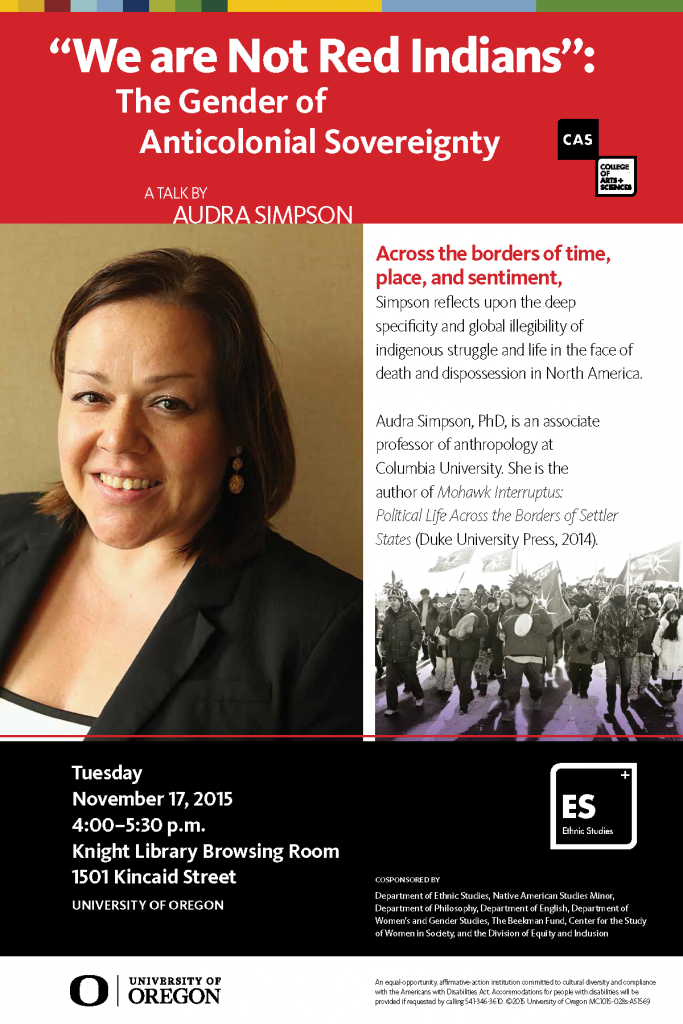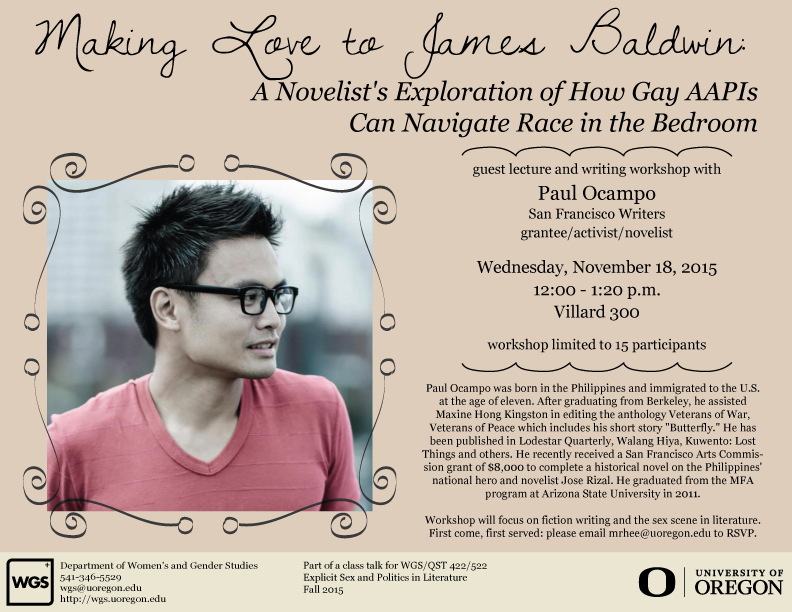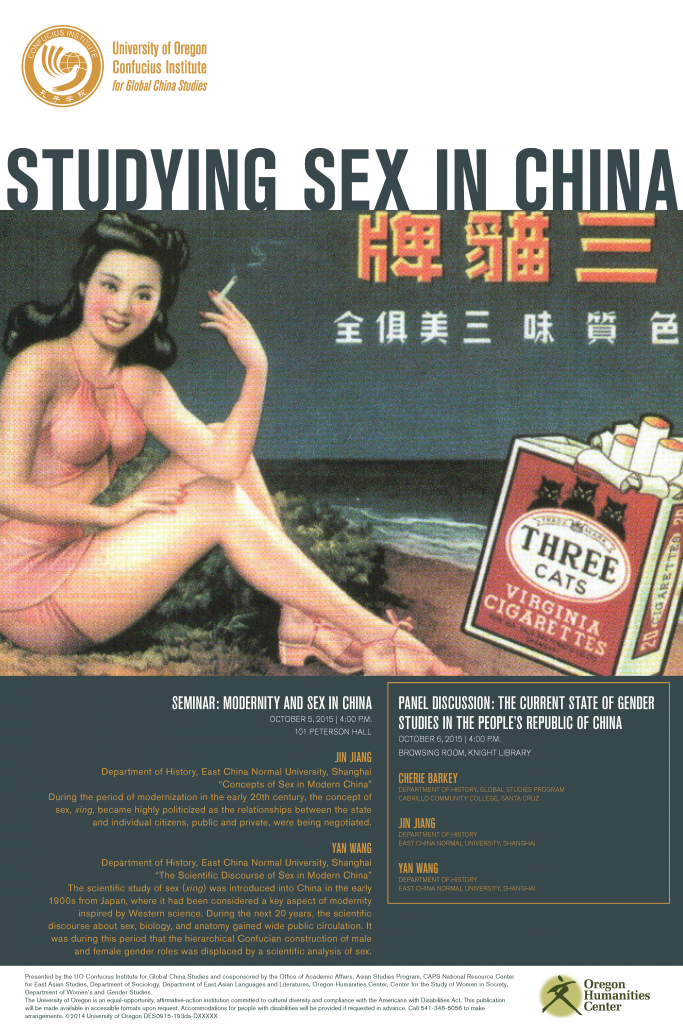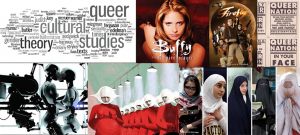Eryn
WGS faculty in the media
Four of our faculty were recently featured in various media spheres. Click the links below to read their comments on topics ranging from economic equality to video game representation.
Margaret Rhee discusses “Love and Romance in the AI Age” in Oregon Quarterly and is featured in podcast on ImagineOtherwise
Elizabeth Reis quoted by Time article “Gender is not just chromosomes and genitals” and in The Atlantic’s “When parents and surrogates disagree on abortion”
Yvonne Braun comments on women’s economic, social and medical well-being across the US on WalletHub
Oluwakemi Balogun interviewed by CAScade magazine for her work on Nigerian beauty pageants
Edmond Chang calls for better representation in video games at UC Santa Barbara talk
Professor Elizabeth Reis quoted in Time article, “Gender is Not Just Chromosomes and Genitals”
The internet and social media are perhaps the most important aspects of the modern age that serve to amplify the voices and experiences of historically oppressed, marginalized or minority populations, and those who identify as genderqueer, transgender or intersex are prime examples.
At the time of writing, South Dakota has just passed a controversial bill that attempts to restrict bathroom usage of individuals to the bathroom that matches with their “chromosomes and anatomy” at birth. But where does this leave people with intersex characteristics, whether visible or invisible? Professor Elizabeth Reis comments in a new Time article on the matter.
Image is from linked article, credit Peter Dazeley.
“We are Not Red Indians”: The Gender of Anticolonial Sovereignty
Please join us for this very special guest lecture with Audra Simpson, PhD, of Columbia University.
When: 17 November 2015, 4:00 pm – 5:30 pm
Where: Knight Library Browsing Room
Across the borders of time, place, and sentiment, Simpson reflects upon the deep specificity and global illegibility of indigenous struggle and life in the face of death and dispossession in North America. Audra Simpson, PhD, is an associate professor of anthropology at Columbia University. She is the author of Mohawk Interruptus: Political Life Across the Borders of Settler States (Duke University Press, 2014).
More new classes for winter!
Class names
WGS 101 – Introduction to Women’s and Gender Studies – NO PREREQS!
WGS 199 – Art, Activism and Pop Culture – NO PREREQS!
WGS 321 – Feminist Perspectives: Identity, Race, Culture
WGS 331 – Rethinking Gender and Technology
WGS 351 – Intro to Global Feminisms – NO PREREQS!
WGS/QST 361 – Gender and Video games – NO PREREQS!
WGS 410/510 – Native Feminisms
See below for full descriptions. Registration opens next week, Monday, November 16th! Register early and secure your seat!
Class Descriptions
WGS 199: Art, Activism and Pop Culture
Professor Margaret Rhee
In this course, we will investigate how art and activism intersect to address pressing contemporary social issues concerning gender, race, and sexuality. In particular, the course focuses on how art is utilized as activism, and vice versa, to address social issues such as the prison industrial complex, sexual assault, and HIV/AIDS. The course takes on a special emphasis on how artist-activists-students have utilized art to organize and create change on the college campus. Along with rigorous reading and writing, students will also engage in the topic of art and activism through constructionist learning—learning through creating—in a special lab component of the class. In groups, students’ will collectively create art/activist projects that address campus, local, or national issues through a feminist lens. The class will conclude with a special symposium where students will present their work to the WGS department and larger campus.
WGS 321 – Feminist Perspectives: Identity, Race, Culture
Professor Lani Teves
! Fulfills Social Science group requirement
! Fulfills American Cultures requirement
This course examines the ways in which race, class, gender, and sexuality intersect to form systems of inequality, formations of identity, and sites for political agency. Multi-racial interdisciplinary feminist perspectives have interrogated the politics within feminist discussions to re-center intersecting identities to better understand the histories, experiences, and the contemporary politics of women of color. This challenge to both the academy and institutional systems has called for a complication of monolithic assumptions within the “study of women.” The readings emphasize theoretical dialogues confronting the complexities of inclusion/exclusion in feminism, first/third world constructions, and difference within difference that further complicate our assumptions of identity, community, and culture. Such frameworks through the course include, but are not limited to; indigenous feminisms, critical race theory, borderlands, and globalization. Through film and literary narratives students will have the opportunity to critically analyze the social positions, representations, and political projects centering the lives and experiences of women of color.
WGS 331 – Rethinking Gender and Technology
Professor Nadia Loan
! Fulfills Identity, Pluralism and Tolerance requirement
Do technologies shape the way in which we understand and enact gender identities or does gender influence the use of technologies? Starting with these questions, this course will probe deep into the world of gender and technology to critically examine the relationship between these two concepts. We will use a broad definition of technology so as to include computers, computer networks and digital media as well as a wide array of everyday objects and things (for e.g. the microwave oven). This course will highlight the social, cultural and political factors that influence the relationship between gender and technology and explore how the meanings and uses of technology are historically and culturally located.
WGS 351 – Intro to Global Feminisms
Professor Irum Shiekh
! Fulfills Social Science group requirement
! Fulfills International Cultures requirement
This course is an exploration of global feminisms, feminist activism, and women’s movements organizing locally and across borders. Through films, readings, and discussion, we will explore the varied expressions of women’s activism at the community, national, and transnational levels, considering how feminists construct diverse interpretations of feminism and how, in the era of globalization, feminist and women’s movements engage and challenge the state, civil society, international agencies, and corporations for a more just world. At the same time, we will explore the tensions, coalitions, and conflicts within transnational feminist theorizing and praxis using case studies from diverse regions around the world. This course meets the Social Science group requirement in that it will consider multiple examples of movements from all over the globe and therefore be broadly comparative in scope. It will also consider multiple different cultural contexts.
WGS/QST 361 – Video Games and Virtual Worlds
Professor Edmond Chang
! Fulfills QST minor requirements
! Fulfills Arts & Letters requirement
! Fulfills Identity, Pluralism and Tolerance requirement
Alexander Galloway in Gaming: Essays on Algorithmic Culture argues that play “is a symbolic action for larger issues in culture” (16) and that video games “render social realities into playable form” (17). Using a broad archive of “imagined worlds”–drawing on literature, film, television, digital games, and scholarship–this course will consider the questions: Why study these “imagined worlds,” how are they important, and what values do they have? In this course, we will look at and analyze texts of media old and new through the interdisciplinary lenses of cultural studies and comparative media and deploy virtual worlds and video games as theories about and to unpack and analyze the intersections race, gender, class, nation, sexuality, and technology, particularly in the US context.
WGS 410/510 – Native Feminisms
Professor Lani Teves
This course examines the foundational and aspirational trajectory of Native feminist scholarship. We will begin by questioning the usefulness of gender as a category of analysis within Native communities and how Native women have responded to feminism. We will trace the intellectual origins of Native feminisms, each week reading a key text in recent publication. With an emphasis on the praxis of Native feminism, we will cover a range of indigenous contexts, but focus primarily on the Americas and the Indigenous Pacific. Topics explored include cultural revitalization and gender roles, change and continuity under cycles of colonialism and settler-colonialism, the connection between colonialism and sexual violence in Native communities, debates over citizenship and sovereignty, and contemporary Native gender roles and identities.
Making Love to James Baldwin: A Novelist’s Exploration of How Gay AAPIs Can Navigate Race in the Bedroom
The Department of Women’s and Gender Studies invites you to
MAKING LOVE TO JAMES BALDWIN: A Novelist’s Exploration of How Gay AAPIs Can Navigate Race in the Bedroom
When: Wednesday, November 18, 2015, 12:00 – 1:20 PM
Where: Villard 300
Featuring a guest lecture and writing workshop with San Francisco Writers grantee/activist/novelist, Paul Ocampo
BIO: Paul Ocampo was born in the Philippines and immigrated to the U.S. at the age of eleven. After graduating from Berkeley, he assisted Maxine Hong Kingston in editing the anthology Veterans of War, Veterans of Peace which includes his short story “Butterfly.” He has been published in Lodestar Quarterly, Walang Hiya, Kuwento: Lost Things and others. He recently received a San Francisco Arts Commission grant of $8,000 to complete a historical novel on the Philippines’ national hero and novelist Jose Rizal. He graduated from the MFA program at Arizona State University in 2011.
Part of WGS/QST 422/522 Explicit Sex and Politics
Fall 2015
Free and open to the public
Workshop limited 15 participants – first come first served; please email mrhee@uoregon.edu to RSVP
Queer Talk & Poetics: A Lunchtime Affair
The Department of Women’s and Gender Studies invites you to
QUEER TALK & POETICS: A Lunchtime Affair
When: Wednesday, November 4, 2015, 12:00 – 1:20 PM
Where: Villard 300
Featuring a talk and poetry reading by TC Tolbert
“Attending/To Attend: Failure as the End Where We Start”
BIO: TC Tolbert often identifies as a trans and genderqueer feminist, collaborator, dancer, and poet but really s/he’s just a human in love with humans doing human things. The author of Gephyromania and several chapbooks, TC is also co-editor of Troubling the Line: Trans and Genderqueer Poetry and Poetics. His favorite thing in the world is Compositional Improvisation(which is another way of saying being alive).
For more information: www.tctolbert.com
Light refreshments provided
Part of a class talk for WGS/QST 422/522 Explicit Sex and Politics
Fall 2015
Free and open to the public
Studying Sex in China
Please join us Monday, October 5th and Tuesday, October 6th for our first event of the year! Studying Sex in China comprises a seminar (Modernity and Sex in China, on Monday) and a panel discussion (The Current State of Gender Studies in the People’s Republic of China, on Tuesday). This event is hosted by the University of Oregon Confucius Institute and is co-sponsored by Women’s and Gender Studies.
When: October 5th, 2015, Monday, 4:00 pm and October 6th, 2015, Tuesday at 4:00 pm
Where: Knight Library Browsing Room
Cost: Free!
(Find the flyer here also, for higher resolution viewing.)
Welcome Dr. Edmond Chang and Dr. Margaret Rhee
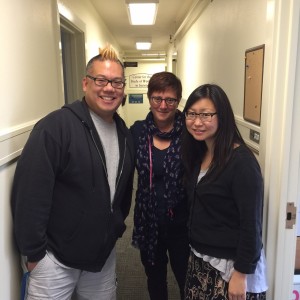 Dear WGS faculty, students, staff, and supporters,
Dear WGS faculty, students, staff, and supporters,
Please join us in welcoming Dr. Edmond Chang and Dr. Margaret Rhee to the Department of Women’s and Gender Studies at the University of Oregon. Both are Visiting Assistant Professors of Women’s and Gender Studies and will be teaching new courses in the department this year, including:
WGS 199: Gender and Pop Culture (“Welcome to the Whedonverse”)
WGS 331: Science/Technology and Gender (“The Fembot, Women and Construction of Difference in Film and Media”)
WGS 422: Explicit Sex and Politics
WGS 422: Advanced Queer Theory
WGS 422: AIDS Art and Activism
WGS 422: Queer(ing) Video Game Studies
Dr. Chang earned his Ph.D. from the University of Washington, where he wrote a dissertation entitled “Technoqueer: Re/con/figuring Posthuman Narratives.” His areas of interest include technoculture, gender and sexuality, cultural studies, video games, popular culture, and contemporary American literature. He has recently published an essay on queerness and celebrity studies called “Gay for Brad” in Deconstructing Brad Pitt, “Teaching Harry Potter: Pedagogy as Play, Performance, and Textual Poaching” in Playing Harry Potter: Essays and Interviews on Fandom and Performance, and “Love is in the Air: Queer (Im)Possibility and Straightwashing in FrontierVille and World of Warcraft” in QED: A Journal of GLBTQ Worldmaking. He is also part of MLA Books’ forthcoming Digital Pedagogy in the Humanities: Concepts, Models, and Experiments authoring the keyword entry “queer.” For more information, see his website here.
Dr. Rhee received her Ph.D. from UC Berkeley in ethnic and new media studies in 2014. From 2014 – 2015, she was the Institute of American Cultures postdoctoral fellow at UCLA. She has published academic articles in Cinema Journal, Sexuality Research and Social Policy, Visual Cultures and the Americas, and Amerasia Journal. She co-edited a special issue of Ada: A Journal of Gender, New Media, and Technology titled “Hacking the Black/White Binary,” with Brittney Cooper. She is currently working on a monograph How We Became Human: Race, Robots, and the Asian American Body. She is also a poet and new media artist. As a poet, she is the author of chapbooks Yellow (Tinfish Press, 2011) and Radio Heart; or, How Robots Fall Out of Love (Finishing Line Press, 2015). She co-edited Glitter Tongue: queer and trans love poems and Mixed Blood, a literary journal on race and innovative poetics edited by CS Giscombe. As a new media artist, she co-conceptualized a participatory action digital storytelling project in the San Francisco Jail.
New classes–sci fi, pop culture, Islam, explicit sex & politics and more!
The WGS department is growing and we are adding new classes as part of this growth. Check them out below!
Class names
WGS 199 – Gender and Pop Culture – NO PREREQS!
WGS 331 – Sci/Technol & Gender – The Fembot, Women, and the Construction of Difference in Film and Media
WGS 399 – Gender and Muslim Modernity – NO PREREQS!
WGS 410/510 – Feminist Science Fiction – NO PREREQS!
QST/ WGS 422/522 – Advanced Queer Theory & Cultural Studies
QST/ WGS 422/522 – Explicit Sex and Politics
See below for full descriptions. Registration is now re-opened for all students regardless of class standing–don’t miss these very special new classes!
Descriptions
WGS199: Gender & Popular Culture – “Welcome to the Whedonverse: Feminism, Fandom, and Popular Culture”
Professor Edmond Chang
This class will take up the challenge of reading, exploring, and critiquing popular culture through the lenses of scholarship, television, film, and everyday media. Specifically, we will look at the works and fandoms of Joss Whedon—including Buffy the Vampire Slayer, Firefly, Dr. Horrible’s Sing-Along Blog, Much Ado About Nothing, and The Avengers—to unpack and analyze the intersections of race, gender, sexuality, and other formations.
WGS 331 – Gender, Science, and Technology: The Fembot, Women, and the Construction of Difference in Film and Media
Professor Margaret Rhee
In this course, we will investigate the cinematic and media representations of the female robot—the fembot. Drawing from theorist Donna Haraway’s essay, “The Cyborg Manifesto,” we will analyze representations of the robot and themes such as gendered labor, sexuality, and intimacy through a feminist and science and technology lens.
WGS 399 – Gender and Muslim Modernities
Professor Nadia Loan
This course aims to introduce students to the diversity of gender roles in various parts of the Muslim world and the role of contextual forces such as colonialism, nationalism, globalization etc. in forging gender identities. In the first half of the course we will consider how colonial and nationalist regimes participated in shaping and redefining gender relations as well as notions of the feminine in the Muslim world. The second half of course will look more closely at the manner in which gender and identity is interwoven with and produced through new and emerging political, cultural and religious practices in the present.
WGS 410/510 – Feminist Science Fiction
Professor Carol Stabile
In the words of author and linguist Suzette Haden Elgin, “SF is the only genre of literature in which it’s possible for a writer to explore the question of what this world would be like if you could get rid of [X], where [X] is filled in with any of the multitude of real world facts that constrain and oppress women.” Science fiction has also provided a space for feminist writers to explore relationships with science, technology, and identity, unfettered by the sexist constraints of professions or institutions and outside the generic conventions of other types of fiction.In this course, we will be looking at feminist science fiction as a form of theory, as a strategy for thinking critically about the present and imagining “what this world would be like” under different circumstances.
QST/ WGS 422/522 – Advanced Queer Theory & Cultural Studies
Professor Edmond Chang
This advanced class will offer an intensive survey of the key terms, texts, and questions of the interdisciplinary fields that make up queer theory and cultural studies, paying particular attention to recent debates and conversations. Through the lenses literature, scholarship, new and old media, and even popular culture, we will engage gender, sexuality, race, nation, (dis)ability, technology, and other identities and intersectionalities.
QST/ WGS 422/522 – Explicit Sex and Politics
Professor Margaret Rhee
This course on “Explicit Sex and Politics” draws upon the work of queer feminist writers and activists such as Kathy Acker, Juana Maria Rodriguez, Samuel Delany, Audre Lorde, and Joel Tan. Through close examination of these texts and queer theory, we will explore questions of power, culture, and representations of queer sex as activist strategy. When is “explicit” sex a feminist and queer activist strategy? How does sex border our notions of queer activism and the “romance” of community?
Register today and secure your seat!
WGS Spring 2015 Newsletter
Happy summer everyone!
The WGS Spring term newsletter is now available. Check it out here.
You can also subscribe to receive it via email by clicking the button at the top. Inside: research updates, winners of our scholarships and awards, faculty awards, pictures of the Sally Miller Gearhart 2015 Lecture and more!
For those of you that like the paper newsletter, we will print a limited number of abbreviated copies to be distributed at graduation. Full versions will be printed and mailed in July, and will also be available as usual in the main office. If you would like to request a paper newsletter via mail, please contact the main office and we will make sure you receive one.
